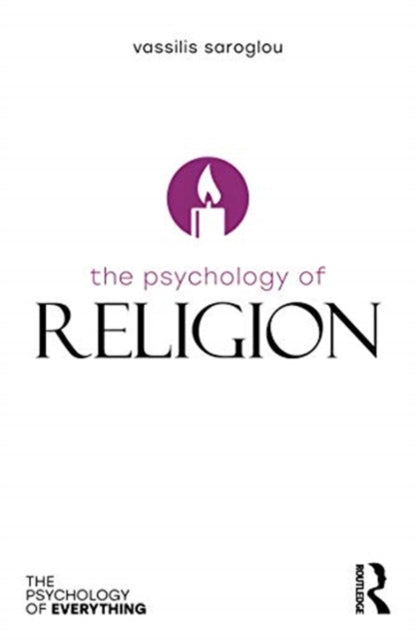Vassilis Saroglou
Psychology of Religion
Psychology of Religion
YOU SAVE £1.51
- Condition: Brand new
- UK Delivery times: Usually arrives within 2 - 3 working days
- UK Shipping: Fee starts at £2.39. Subject to product weight & dimension
Bulk ordering. Want 15 or more copies? Get a personalised quote and bigger discounts. Learn more about bulk orders.
Couldn't load pickup availability
- More about Psychology of Religion
The Psychology of Religion explores the complex relationship between religion and mental health, examining the effects of religious beliefs, practices, and experiences on well-being. It discusses the benefits of religion, such as providing a sense of purpose, social support, and emotional comfort, as well as the potential risks and challenges associated with religious involvement, such as discrimination, violence, and mental health problems.
Format: Paperback / softback
Length: 132 pages
Publication date: 08 October 2020
Publisher: Taylor & Francis Inc
The Psychology of Religion delves into the intricate and multifaceted realm of human beliefs, exploring the diverse perspectives individuals hold regarding religion and religious faiths. It examines the complex interplay between factors such as spirituality,fundamentalism,atheism,and personal choices, shedding light on the determinants that shape our religious inclinations. The book delves into the profound effects of religion on morality, health, and social behavior, raising crucial questions about its enduring relevance in contemporary society.
Drawing from a comprehensive range of psychological theories and research, The Psychology of Religion presents a balanced and nuanced analysis. It acknowledges that both religiosity and atheism carry their own psychological implications, with certain aspects becoming more salient in specific contexts. By examining these dynamics, the book offers valuable insights into the psychological costs and benefits associated with religious beliefs and practices.
One of the central themes of The Psychology of Religion is the influence of genes, environment, personality, cognition, and emotion on religious beliefs and practices. The book explores the complex interplay between these factors, suggesting that they may shape our religious inclinations and experiences. For instance, genetic factors may contribute to the prevalence of certain religious traits, while environmental factors, such as childhood experiences or cultural influences, can shape our understanding and interpretation of religion.
Personality traits, such as openness to experience, agreeableness, and conscientiousness, have also been found to play a significant role in shaping religious beliefs and practices. Individuals with certain personality characteristics may be more inclined to engage in religious activities, while others may be less receptive to religious beliefs. Cognitive processes, such as cognitive biases and information processing, can also influence our religious beliefs and behaviors. For example, individuals may rely on selective exposure or confirmation bias to reinforce their existing religious beliefs, while others may be more open to alternative perspectives.
Emotional factors, such as anxiety, stress, and hope, have been linked to religious beliefs and practices. Individuals may turn to religion as a source of comfort and support during difficult times, or as a means of coping with existential questions and uncertainties. Moreover, religious experiences, such as prayer, meditation, and religious rituals, can evoke powerful emotional responses that shape our beliefs and behaviors.
The Psychology of Religion also examines the effects of religion on morality, health, and social behavior. Research has shown that religious individuals tend to exhibit higher levels of morality, such as altruism, empathy, and forgiveness, compared to non-religious individuals. Religious beliefs and practices have also been associated with better health outcomes, such as lower rates of depression, anxiety, and cardiovascular disease. Additionally, religious communities often provide social support and a sense of belonging, which can have positive effects on individuals' well-being.
However, it is important to note that the relationship between religion and well-being is complex and multifaceted. Different religions and religious practices may have different effects on individuals, depending on their cultural, social, and personal backgrounds. Moreover, the impact of religion on well-being can vary across different contexts, such as different cultures, societies, and individuals.
Despite these challenges, The Psychology of Religion offers valuable insights into the complex relationship between religion and well-being. It highlights the importance of understanding the psychological factors that shape our religious beliefs and practices, as well as the potential benefits and costs associated with religious involvement. By promoting a deeper understanding of the psychology of religion, The Psychology of Religion can contribute to a more informed and nuanced discussion about the role of religion in contemporary society.
In conclusion, The Psychology of Religion is a comprehensive and insightful exploration of the complex interplay between religion, beliefs, and human psychology. By examining the factors that shape our religious inclinations, the effects of religion on morality, health, and social behavior, and the challenges and opportunities facing religious communities in modern society, the book offers valuable insights into the psychology of religion and its implications for our understanding of human behavior and society.
Weight: 170g
Dimension: 131 x 196 x 15 (mm)
ISBN-13: 9780815368120
This item can be found in:
UK and International shipping information
UK and International shipping information
UK Delivery and returns information:
- Delivery within 2 - 3 days when ordering in the UK.
- Shipping fee for UK customers from £2.39. Fully tracked shipping service available.
- Returns policy: Return within 30 days of receipt for full refund.
International deliveries:
Shulph Ink now ships to Australia, Belgium, Canada, France, Germany, Ireland, Italy, India, Luxembourg Saudi Arabia, Singapore, Spain, Netherlands, New Zealand, United Arab Emirates, United States of America.
- Delivery times: within 5 - 10 days for international orders.
- Shipping fee: charges vary for overseas orders. Only tracked services are available for most international orders. Some countries have untracked shipping options.
- Customs charges: If ordering to addresses outside the United Kingdom, you may or may not incur additional customs and duties fees during local delivery.


